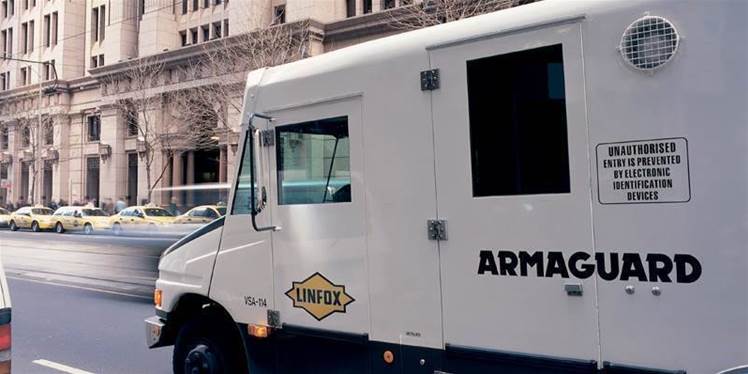Linfox Armaguard is at a crossroads.

The cash market is on a steep decline. The past two decades have seen a dramatic change in the way we pay in Australia, with cash falling to just 35 percent of transactions at last count from 70 percent ten years ago.
Cards now account for around two-thirds of non-cash payments, and the cash market is only predicted to get smaller as technology companies and banks offer myriad new ways to pay. That's not even mentioning all the promise of the new payments platform (NPP).
It’s a classic case of digital disruption, and presents somewhat of an existential crisis for a company that has sat comfortably at about 70 percent of the cash-in-transit market share for many years.
There’s no doubt the company needs to find a new core business. But the question is: what?
Getting the house in order
At the start of this year, CEO Gary Allen set out his strategy for the business to 2020: he wants the company to be the industry leader in delivering “innovative and integrated security, currency, valuables, and technology solutions”.
What that means in practice is yet to be fully determined. Allen spoke of expanding the company’s existing offerings to “fully integrated end-to-end technology solutions” wherever possible, and of “gaining a deeper understanding” of customer needs in order to deliver “innovative solutions” that would “improve their operations”.
However, a large part of the 2020 strategy is actually inward looking: at Armaguard’s staff, in particular its IT team.
The company’s IT shop is what you would consider to be fairly traditional: a waterfall operation that focuses on singular big pieces of work at a time, and is considered a sunk cost within the business.
That’s all about to change.
Armaguard has just completed a review - with the help of former VicRoads CIO-turned advisor Susan Sly - that promises to completely turn the IT shop on its head.
“My team and I had put together an IT strategy as part of our corporate strategy, but we realised it wasn’t truly aligned to where the company needs to go,” Armaguard CIO Jeremy Bates told iTnews.
Most of the problems were around governance and listening to the business; how work is prioritised, and how well the IT shop was actually providing what the customer needed.
It required a fundamental rework of the department - what Bates says will be the biggest transformational change in his 13 years running IT for Armaguard.
“Everything around service delivery, governance, strategy is under review,” he said.
“Roles will move from a very traditional structure to the new world and way of doing things, aligned to strategy: a typical infrastructure manager would move into a broader architecture role, ensuring that more strategic decisions could be made about moving our environments into the cloud [for example]."
It’s somewhat of a first step towards an agile approach, but Bates is keen to avoid the term; he prefers “nimble”.
“As opposed to the full rigidity of agile, I’m going to create an environment of ‘fail fast, but get up quicker’,” he said.
“Allow people to fail, give them the support to fail, and then help them to get up quicker. It’s iteration management.”
He said there would continue to be a role for all of the existing 35 workers in the Armaguard IT team; the firm will invest in upskilling existing staff to meet its future needs.
Bates is currently building out his model for the new-look IT shop, as well as reviewing the IT environment to work out “what needs to be fixed”.
“If we create an environment that continues to flourish around enablement, delivery, good governance, and a strategic view of the work, we [the IT team] will be the enabler," Bates said.
Where to from here?
The focus now is on working out how Armaguard fits in a cashless world.
The company is naturally coy about the paths it is considering lest it reveal a strategic advantage. But Bates indicates technology will have a big role to play.
Armaguard is looking at opportunities in its ITS group business, a provider of integrated self-service technology solutions for ATMs.
“We’re looking at adjacent markets in all kinds of machines, and using ITS as a real technology leader specifically in that retail bank space,” Bates said.
Armaguard is also in the “very embryonic” stages of seeing whether it can do anything with distributed ledger platforms, or blockchain.
“What secure method in a distributed world can we use? Blockchain fits some of that criteria but it’s very, very irregular from a regulatory point of view,” Bates said.
“We’re looking at it but we’re right at the start, because we don’t know yet how it could fit - especially when we are so highly regulated.”
Over the next five to ten years, Bates expects Armaguard's expansion into new areas will likely be through acquisitions.
What is clear to Bates and Armaguard, however, is that “technology is at the heart of a lot of the change we have to make”.


_(23).jpg&h=140&w=231&c=1&s=0)

_(28).jpg&h=140&w=231&c=1&s=0)






 iTnews Executive Retreat - Security Leaders Edition
iTnews Executive Retreat - Security Leaders Edition
 iTnews Cloud Covered Breakfast Summit
iTnews Cloud Covered Breakfast Summit
 The 2026 iAwards
The 2026 iAwards












_(1).jpg&h=140&w=231&c=1&s=0)



